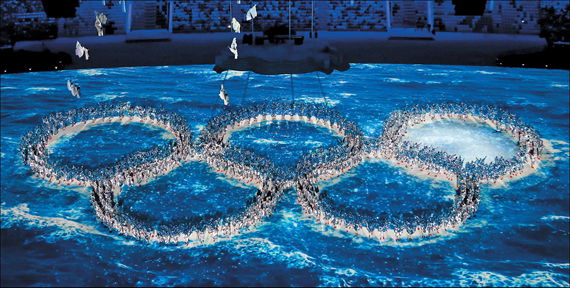Russia closes Sochi on a high
 0 Comment(s)
0 Comment(s) Print
Print E-mail Shanghai Daily, February 24, 2014
E-mail Shanghai Daily, February 24, 2014
|
|
|
Performers form the Olympic rings during the 2014 Sochi Winter Olympics closing ceremony yesterday. |
Sochi's US$50 billion Olympics closed yesterday with Russia seizing first place in the medals table.
Russia guaranteed top spot after a clean sweep of the men's 50km cross country race thanks to Alexander Legkov, Maxim Vylegzhanin and Ilia Chernousov.
The hosts then hammered home their supremacy when Alexander Zubkov claimed his second gold in Sochi by leading the four-man bobsleigh team to victory. Russia ended its own Games with 13 golds and a total of 33 medals, topping the table ahead of Norway.
IOC President Thomas Bach added to Russia's feel-good factor by describing the 2014 Games as "great," saying the response from the athletes was "overwhelmingly positive."
"These were excellent Games that may lead to the reversal of some criticism" of the Russian organizers that preceded the Olympics, Bach said.
Sweden center Nicklas Backstrom failed a doping test for a substance found in an allergy medication and was withdrawn from the hockey final.
Earlier, Austrian cross-country skier Johannes Duerr, who had been due to take part in the men's 50km, tested positive for blood booster EPO in a pre-competition test on February 16.
Duerr became the fifth athlete to be excluded over a positive doping test from the Sochi Games, where the IOC has been carrying out more tests than ever, with a new emphasis on pre-competition tests. The Austrian took part on February 9 in the skiathlon, finishing eighth but tested positive a week later. Duerr told Austrian television after arriving back home that he had "disappointed so many people... with my stupidity." "I have nothing to say other than to apologize to everyone, to my family and my wife."
Ukrainian cross country skier Marina Lisogor, Latvian men's ice hockey player Vitalijs Pavlovs, German biathlete Evi Sachenbacher-Stehle and Italian bobsledder William Frullani all failed tests.
But Russian officials were keen to bask in the 16-day showpiece that passed off relatively unscathed. "The ice of the scepticism towards the new Russia has been broken," said Deputy Prime Minister Dmitry Kozak. "The Games have made the country, the culture, and the people a little closer and more understandable for the world."






